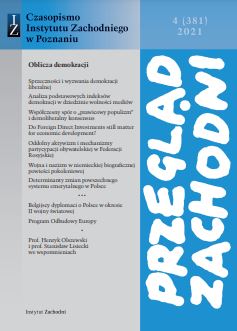SPRZECZNOŚCI I WYZWANIA DEMOKRACJI LIBERALNEJ ZARYSOWANIE POLA REFLEKSJI
CONTRADICTIONS AND CHALLENGES OF LIBERAL DEMOCRACY. OUTLINE OF THE FIELD OF REFLECTION
Author(s): Tomasz NakonecznySubject(s): Political Theory, Government/Political systems, Politics and society
Published by: Instytut Zachodni im. Zygmunta Wojciechowskiego
Keywords: liberal democracy; equality; freedom; tradition; emancipation; Realpolitik; postcolonial studies;
Summary/Abstract: The aim of the article is to show the weaknesses of the demoliberal paradigm resulting both from its internal, discursive conditions, as well as from its historical grounding together in the course of the cultural and civilizational evolution of Western societies (on the trajectory of premodern - modern - postmodernity) and in the structures of hegemonic and dependence relations between the West and the non-Western world. The issue under consideration appears to be important because the aforementioned weaknesses affect the development prospects of the demoliberal formation in the contemporary world, the specificity of which is in turn largely determined by the post-colonial status structure and the increasingly clear symptoms of the reconfiguration of the international system of power and dependencies. The basic internal contradiction of the demoliberal discourse is based on the contradictory implications of the idea of equality and freedom, the latter of which is dynamized by emancipatory tendencies that violate the ordering powers of an equality utopia. The noticed contradiction emphasizes the growing importance of identity politics in contemporary liberal democracies. The latter derives largely from the conflict of tradition and revolution, fundamental to the beginnings of modernity, the latter of which, as a social force and as a political and social project, is motivated by, among other things, democratic and liberal ideas. The entanglement of the democratic-liberal evolution in cultural contradictions and apories characteristic of the history of the Western world calls into question the universalism of the demoliberal paradigm. On the other hand, the conflict of utopias, both those under the sign of tradition and those under the sign of the revolution, is being relativized due to the emancipatory tendencies that destroy both them. The formal fulfilment of an equality and freedom utopia not only does not mitigate the aspirations for further emancipation, but also seems to be conducive to deepening the identity dilemmas of demoliberal societies. The particularization of identity discourses that takes place in this context threatens the social consensus around traditional demoliberal values. It also threatens the authority of the demoliberal formation, its coherence and credibility in the perception of different cultures, in relation to which the former plays an analogous role as it played at the dawn of Western European modernity in relation to tradition. The author sees a remedy for the crisis of cohesion and credibility of the demoliberal formation, among others in broadening the scope of inclusiveness by liberal culture of various identity policies, as well as in deepening the practices of deliberativeness responsible for social consensuality. Noticing the importance of the discursive and moral factor in the article does not obscure the influence of Realpolitik on contemporary liberal democracy. Real politics emphasizes the importance of the United States as the leader of the demoliberal camp, although it does not yet determine whether and how the American center of power will retain its stabilizing powers in the reality of a multipolar order. Due to the interdiscursive nature of the considerations, inevitable due to their subject matter, the article refers to a broader disciplinary background, including, apart from the above-mentioned postcolonial studies, e.g. philosophical anthropology, historiosophy, political theory and cultural criticism.
Journal: Przegląd Zachodni
- Issue Year: 381/2021
- Issue No: 04
- Page Range: 7-30
- Page Count: 24
- Language: Polish

